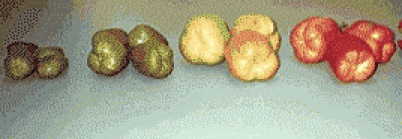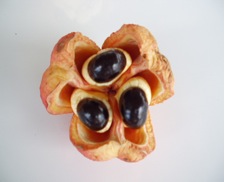Food
Haitian Ackee Fruit
Do Not Eat Unripe Ackee Fruit or the Seeds and Rind of Ripe Ackee Fruit
Toxins in the Fruit can Cause Illness or Death
(also available in Creole (Kreyòl))
January 2010
People in Haiti with access to ackee orchards might try to eat the fruit as a result of food scarcity due to the recent tragic earthquake. They should not eat unripe ackee fruit, or certain parts of the ripe fruit, because naturally occurring toxins in them can cause sickness or death. Photos of unripe and ripe fruits are shown below.
There are several ackee orchards not far from the Port au Prince, Haiti, airport that we know of. The fruit on the trees are in various stages of ripeness.
Description of unripe fruit: When ackee fruit is not ripe, it’s mostly green. As it ripens, it turns a greenish-yellow to mostly-red color; then the three seams along the outer rind start splitting open.
Description of ripe fruit: When the ackee fruit is ripe, it splits wide open. The edible part is the plump flesh, pale-to-buttery yellow in color, that clings to the lower part of the seed. This portion is called the aril. A shiny black seed sits on top of each aril. Only the aril is edible, and only after the fruit has ripened completely. The seeds and the rind contain high levels of toxins and should not be eaten, even when ripe.

Unripe Ackee

Ripe Ackee
Some Haitians might not be familiar with ackee fruit, as the fruit grown in Haiti is processed and shipped to the United States. They might not know that the fruit can be toxic.
The toxin in unripe ackee fruit can cause an extreme, dangerous drop in blood-glucose levels (hypoglycemia) that can be fatal. Symptoms of poisoning from unripe ackee fruit include drowsiness, followed by repeated vomiting that results in thirst. In acute cases, the poisoning may cause exhaustion of the muscular and nervous systems, collapse, coma, and death. Occasionally, delirium, fever, and loose bowels occur. Generally, there is no abdominal cramping or diarrhea.
Anyone with these symptoms should immediately seek medical treatment.
The toxins in unripe ackee fruit are called hypoglycin A and hypoglycin B.
The names of the known ackee orchards, each located in the Croix des Bouquets area, are:
LaMoriniere
Roche Blanche
DuJour
Contact numbers for the firm that processes the fruit are: (contact Ursula or Junior)
509 3 443-8205; 3 455-0733; 510-7083
perryexport@hotmail.com.







